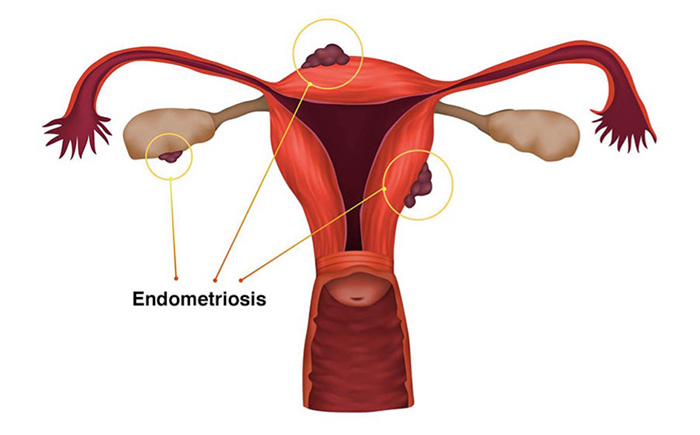Endometriosis Specialist Melbourne
Endometriosis is a common condition that affects women, typically from mid to late teens up to menopause. Up to 1 in 10 women may be affected by the disease during their fertile life. Up to 4 in 10 women who suffer infertility even without any symptoms of the condition may be diagnosed with endometriosis.
There is a strong association between endometriosis and infertility so it’s crucial we advocate for increased awareness and proactive management strategies to help improve those affected.
What is Endometriosis?
Endometriosis is a condition where inflammatory cells, similar to the normal uterine lining cells, grow outside the uterus. These cells still respond to menstruation hormones, and when they bleed can become trapped and irritate surrounding tissues, causing scar tissue to form. Over time, this tissue outside of the uterus tends to increase in size and spread to other areas. Endometriosis affects at least 10% of women of menstruating age.


What causes Endometriosis?
No one knows why Endometriosis occurs. There are a number of theories as to why some women develop the condition, but other women do not. There may be a family connection. If a close relative has Endometriosis you are more likely to develop it also, indicating a possible genetic link.
How is Endometriosis diagnosed?
The symptoms of endometriosis vary, and other conditions may cause similar symptoms. To determine whether you have endometriosis, we use a pelvic ultrasound. However, this will usually only reveal moderate to severe endometriosis disease.
The ultrasound will also exclude other pathology in the pelvis. The only certain way to diagnose endometriosis is by laparoscopy, using minimally invasive surgery with a very thin telescope called a laparoscope to view the pelvic cavity.
How is Endometriosis treated?
There are a variety of treatment options for endometriosis, depending on the extent and location of the disease, the severity of symptoms, your age and your reproductive plans. Our treatment usually includes a combination of pain medications, hormonal therapy, surgery and natural therapies.
Medication
Pain medications involve various over-the-counter analgesics or anti-inflammatory drugs. Prolonged use may have negative side effects and if the maximum dose has already been reached without providing relief, there are other treatment options.
Hormone therapy
Surgery
The aim of surgery is to remove endometriosis by way of excisional surgery and to repair any organs affected. Removing endometriosis reduces associated pain and increases the chance of pregnancy in women with reduced fertility. Endometriosis growth, scar tissue and adhesions can be removed without removing your reproductive organs through laparoscopy. At surgery, all endometriosis disease is excised with preservation of the reproductive organs. In rare cases, and only in women with very severe disease who have completed their family, hysterectomy and oophorectomy (ovarian removal) may be indicated.
Fertility treatment and endometriosis
About 30% of women with endometriosis report difficulty getting pregnant, though most women with mild endometriosis can have children naturally. As endometriosis tends to worsen with time, it is best to start trying as soon as possible.
In moderate to severe endometriosis, laparoscopic surgery to remove endometrial foci can increase the chance of pregnancy. If you are in your late 30s or early 40s, or have been trying to fall pregnant for some time, IVF treatment may be recommended.
Endometriosis is a chronic condition and can reoccur, despite full laparoscopic excisional surgery, even years later.
Endometriosis specialist in Melbourne
At Create Health, our gynaecologists care for many women with endometriosis and are skilled in the management of all cases, from mild ones to the most severe disease. Our fertility and endometriosis surgeons are highly experienced and well regarded. A number of our Create Health doctors have completed a two-year advanced laparoscopic surgery fellowship, training to the top level in laparoscopic surgery (level 6), specialising in Endometriosis surgery. Create Health has more advanced trained Laparoscopic surgeons than any other private medical unit in Victoria.
They work with a multidisciplinary team of other surgical disciplines when required. Our doctors also work with our in-house allied health team to further help women with their pain. Our pelvic pain specialist, dietician, perinatal psychologist and pelvic floor physiotherapist give women important and practical help. They will assist with inflammatory diet planning and foods to avoid, strategies to deal with the stress of living with chronic pain and aim to address symptoms of sexual pain, constipation and urinary issues. These health specialists all have a role to play in modern endometriosis management and can help you.
For more information on specialist endometriosis management please contact us on (03) 9873 6767 or email us via our contact form.



